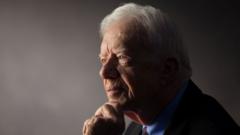In the years since Jimmy Carter left the presidency, America has encountered a wave of ongoing challenges that echo those of the late 1970s when he led the nation. The four decades that have passed culminated in a unique historical context for President Joe Biden as he confronts similarly complex issues in 2024. From economic instability to international conflicts, the trials of yesterday resonate with today’s political landscape.
During Carter's presidency, a profound crisis of confidence swept through the nation, fueled by economic strife and external threats to American authority. Fast forward to the current day, and Biden mirrors these struggles as he tackles inflation, climate change, and geopolitical tensions involving Russia and the Middle East. Despite decades apart, the themes remain hauntingly relatable.
Carter's most formidable diplomatic achievement, the Camp David Accords, showcased the power of American diplomacy, uniting Egypt and Israel under a peace agreement in 1978. However, the elation turned fleeting as the Iranian hostage crisis swiftly highlighted the limitations of U.S. influence abroad. The painful lessons learned during that tumultuous time still resonate within Biden's presidency, as seen through the chaotic withdrawal from Afghanistan and the ongoing crisis in Gaza.
Set against a backdrop of global conflict, both leaders faced formidable challenges from imposing foreign powers. While Carter's dispute with the Soviet Union amid the invasion of Afghanistan drew heavy criticism, Biden’s response to Russian aggression in Ukraine has demonstrated a more united front. Yet the challenges persist, encompassing issues once again emerging in the Middle East, where the unresolved Palestinian situation has grown urgent amidst renewed hostilities.
The perception of national capability remains a crucial element affecting public trust. During Carter's era, a significant ebb in public confidence was noted, with trust in government dipping alarmingly. This cycle of distrust persists today, a fact Biden hasn’t been able to change significantly, leading to increasingly fractured political dynamics.
Interestingly, both Carter and Biden are often juxtaposed with their differing approaches to leadership. Carter, who embraced a humble style, starkly contrasts with the more flamboyant demeanor characteristic of former President Donald Trump. As Biden navigates his presidency, the haunting echoes of Carter's tenure underscore the cyclical nature of American governance and the enduring challenges that define each leader’s legacy.
In summary, as the United States navigates these inflection points in international relations and domestic policy, Carter's legacy serves as both a reminder and a cautionary tale for Biden, presenting an intricate tapestry of political struggles across generations. The complexities facing both presidents prompt reflections on leadership, public trust, and America’s ever-evolving role on the world stage.



















